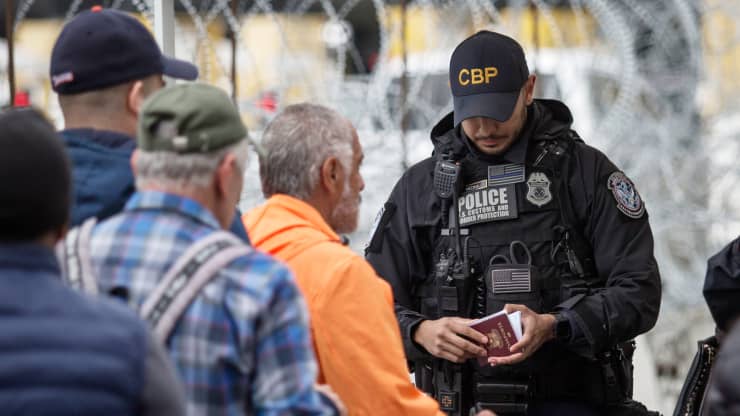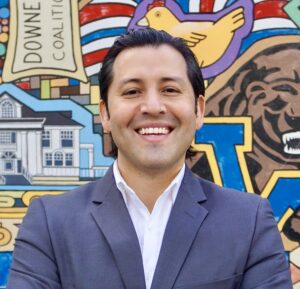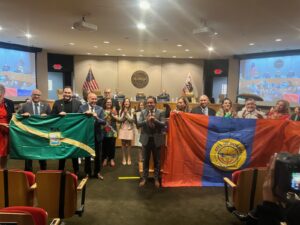The bill’s lead sponsors, Representative Linda Sánchez of California and Senator Bob Menendez of New Jersey unveiled the legislation in the Senate and the House
Staff

Congresswoman Linda Sánchez (CA-38) and U.S. Senator Bob Menendez (D-NJ) today introduced the bicameral U.S. Citizenship Act of 2021, President Biden’s framework for the future of the United States immigration system. Rep. Lucille Roybal-Allard (CA-40), and Sens. Alex Padilla (D-CA), among others, joined as chief cosponsors.
“I am deeply proud to introduce the U.S. Citizenship Act in the House of Representative today, a vision that provides long-overdue permanent protections, and restores humanity and American values to our immigration system,” said Congresswoman Linda T. Sánchez.
“I am the daughter of immigrant parents from Mexico, this is personal to me. I have dedicated my career to building an immigration system that lets people live without fear, and a system that gives immigrants – like my parents – who sought a better life and contribute to our nation a fair opportunity to thrive. With President Biden’s leadership and vision, Democratic majorities in both Chambers, and the support of the majority of Americans: this is our moment to finally deliver big, bold, and inclusive immigration reform that our nation and its people deserve.”
“As the son of Cuban immigrants who fled an oppressive regime for a better life in the United States, I have dedicated much of my career in Congress, both in the House and the Senate, fighting for the dignity of immigrant families in New Jersey and all across America. Immigrants contribute greatly to our country and society; they own businesses, pay taxes and teach our children, they are our coworkers, neighbors and friends,” said Sen. Robert Menendez.
“Over my 28 years in Congress, I and the members of the Congressional Hispanic Caucus have worked hard to reform our broken immigration system. This bill will help ensure that immigrants like those in my district who strengthen our economy and add so much value to our communities are treated with dignity and respect. It will reunite and keep families together and protect the millions of undocumented immigrants who contribute to our nation, including those serving in our armed forces and on the front lines battling the COVID-19 pandemic. I am thrilled that this legislation builds on the principles of my Dream and Promise Act and expedites a pathway to citizenship for all DACA-eligible youth, as well as Temporary Protected Status (TPS) and Deferred Enforcement Departure (DED) recipients.” said Rep. Lucille Roybal-Allard.
According to its creators, the U.S. Citizenship Act of 2021 establishes a moral and economic imperative and a vision of immigration reform that is expansive and inclusive:
Creates an earned roadmap to citizenship for all 11 million undocumented immigrants, providing Dreamers, TPS holders, and some farmworkers with an expedited three-year path to citizenship, and giving all other undocumented immigrants who pass background checks and pay taxes with an eight-year path to citizenship without fear of deportation.
Reforms family-based immigration system to keep families together by recapturing visas from previous years to clear backlogs, including spouses and children of green card holders as immediate family members, and increasing per-country caps for family-based immigration.
It also eliminates discrimination facing LGBTQ+ families, provides protections for orphans, widows and children, allows immigrants with approved family-sponsorship petitions to join family in the U.S. on a temporary basis while they wait for green cards to become available.
Grows our economy by making changes to the employment-based immigration system, eliminating per-country caps, making it easier for STEM advanced degree holders from U.S. universities to stay, improving access to green cards for workers in lower-wage industries, and giving dependents of H-1B holders work authorization, and preventing children of H-1B holders from aging out of the system.
The bill also creates a pilot program to stimulate regional economic development and incentivizes higher wages for non-immigrant, high-skilled visas to prevent unfair competition with American workers.
Increases fundings for immigrant integration initiatives and supports state and local governments, NGOs, and other community organizations that conduct inclusion programs, provide English language assistance, and make available naturalization resources to immigrant communities.
Protects workers from exploitation and improves the employment verification process by requiring the Department of Homeland Security (DHS) and the Department of Labor to establish a commission involving labor, employer, and civil rights organizations to help improve the employment verification process and granting workers who suffer serious labor violations greater access to U visa relief.
Supports asylum seekers and other vulnerable populations by eliminating the one-year deadline for filing asylum claims, reducing asylum application backlogs, increasing protections for U visa, T visa, and VAWA applicants, including by raising the cap on U visas from 10,000 to 30,000.
“For too long, our immigration system has failed to live up to the ideals and principles our nation was founded on. We must enact bold, robust immigration reform that meets the urgency this moment demands — and that millions of hard working immigrants have earned,” said Sen. Padilla.
“As the son of immigrants from Mexico, I am proud to join Senator Menendez and Congresswoman Sánchez in introducing this legislation to restore humanity to our immigration system and give everyone a fair shot at achieving the American dream.”
The bill also addresses the root causes of migration and prioritizes U.S. national security:
Addresses the root causes of migration from Central America by funding the President’s four-year plan to increase assistance to El Salvador, Guatemala, and Honduras conditioned on their ability to reduce the corruption, violence, poverty, and famine that now causes people to flee.
Creates safe and legal channels for people to seek protection, so they can apply for legal status in Central America instead of making the dangerous journey north.
The bill also re-institutes the Central American Minors program to reunite children with U.S. relatives and creates a Central American Family Reunification Parole Program to more quickly unite families with approved family sponsorship petitions.
Cracks down on bad actors by enhancing the ability to prosecute individuals involved in smuggling, narcotics and trafficking networks who are responsible for drugs flowing into our country and the exploitation of migrants. It will also expand transnational anti-gang task forces in Central America.
Improves the immigration courts and protects vulnerable individuals by expanding family case management programs, reducing immigration court backlogs, expanding training for immigration judges, and improving technology for immigration courts.
It also restores fairness and balance to our immigration system by providing judges and adjudicators with discretion to review cases and grant relief to deserving individuals, and also gives funding for school districts educating unaccompanied children.
Modernizes and manages the border effectively through the use of technology that enhances our ability to detect contraband and counter transnational criminal networks since illicit drugs are most likely to be smuggled through legal ports of entry.
It also authorizes and provides funding for plans to improve infrastructure at ports of entry to enhance the ability to process asylum seekers and detect, interdict, disrupt and prevent narcotics from entering the United States.
Protects border communities by providing for additional rescue beacons to prevent needless deaths along the border, requiring agent training and oversight to investigate criminal and administrative misconduct, and requiring department-wide policies governing the use of force.
It also authorizes and provides funding for DHS, in coordination with the Department of Health and Human Services (HHS) and nongovernmental experts, to develop guidelines and protocols for standards of care for individuals, families, and children in CBP custody.










